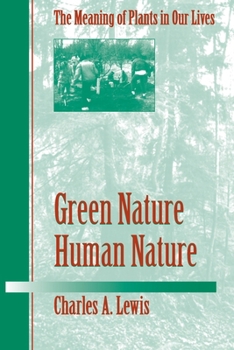Green Nature/Human Nature: The Meaning of Plants in Our Lives
Select Format
Select Condition 
Book Overview
"Our ties to the green world are often subtle and unexpected. It is not merely that hemoglobin and chlorophyll bear a striking similarity in structure, or that plants provide the pleasure of food and flowers."--from the Preface
Why do gardeners delight in the germination and growth of a seed? Why are our spirits lifted by flowers, our feelings of tension allayed by a walk in a forest or park? What other positive influences can green nature
bring to humanity?
In Green Nature/Human Nature Charles A. Lewis describes the psychological, sociological, and physiological responses of people to vegetation in cities and forests, as well as in horticultural therapy programs in hospitals, geriatric institutions, physical rehabilitation centers, drug rehabilitation programs, and correctional institutions. He presents an evolutionary basis for the human attraction to plants. People-plant interactions are presented from two perspectives: participatory, in which the individual is involved in planting and maintaining the vegetation, and observational, in which the individual bears no responsibility for establishing or maintaining the vegetation.
In what amounts to a straightforward catalog of well-documented and tangible benefits, Lewis brings the latest and best research into plant/human interaction to bear on questions of how green nature is intertwined with the human psyche and how that interaction can lead to enhanced well-being and an appreciation of the human dimension in environmental concerns.
Lewis's work will be essential reading for anyone interested in plants
and how they affect people.
A volume in the series The Environment and the Human Condition
Why do gardeners delight in the germination and growth of a seed? Why are our spirits lifted by flowers, our feelings of tension allayed by a walk in a forest or park? What other positive influences can green nature
bring to humanity?
In Green Nature/Human Nature Charles A. Lewis describes the psychological, sociological, and physiological responses of people to vegetation in cities and forests, as well as in horticultural therapy programs in hospitals, geriatric institutions, physical rehabilitation centers, drug rehabilitation programs, and correctional institutions. He presents an evolutionary basis for the human attraction to plants. People-plant interactions are presented from two perspectives: participatory, in which the individual is involved in planting and maintaining the vegetation, and observational, in which the individual bears no responsibility for establishing or maintaining the vegetation.
In what amounts to a straightforward catalog of well-documented and tangible benefits, Lewis brings the latest and best research into plant/human interaction to bear on questions of how green nature is intertwined with the human psyche and how that interaction can lead to enhanced well-being and an appreciation of the human dimension in environmental concerns.
Lewis's work will be essential reading for anyone interested in plants
and how they affect people.
A volume in the series The Environment and the Human Condition
Format:Paperback
Language:English
ISBN:0252065107
ISBN13:9780252065101
Release Date:February 1996
Publisher:University of Illinois Press
Length:176 Pages
Weight:0.60 lbs.
Dimensions:0.5" x 6.0" x 9.0"
Customer Reviews
4 ratings
Lacking in the psychology...
Published by Thriftbooks.com User , 17 years ago
I thought this book was a great introduction to the theories and ideas behind Horticultural Therapy, Wilderness Programs, and other such rehabilitative nature-based programs. It provides a good general overview and is easy to read. For someone (like me) who is looking for a book more advanced psychological explanations and discussions, I'd look somewhere else. Lewis is an alright writer, but he is a horticulturalist, not a psychologist. He often lacks the insight into how and why plants are meaningful in our lives. I would provide another recommendation, but I'm still searching myself! In general, a very good read. He's spot-on with a lot of stuff...just don't expect mind-blowing insights on the psychological impacts of the treatments and programs he discusses.
Valuable resource
Published by Thriftbooks.com User , 23 years ago
This book is filled with valuable information about our relationship with nature--and, therefore, ourselves at a very deep level. I find it an incredible resource, citing research on community gardens, horticultural therapy, the deep and enduring relationship between people and plants. Gardeners, environmentalists, and anyone who loves plants will find reinforcement, information, and inspiration in these pages.
A Gardener's Must Read!
Published by Thriftbooks.com User , 24 years ago
Charles Lewis is the undisputed champion of people-plant relationships. A learned man, well-versed in all aspects of horticulture, Lewis is also an excellent writer. Lewis asks: "In what ways do plants enter our mental and spiritual lives?" What exactly is the importance of cultivating our own "inner garden." Gardens grow persons, not just plants. Lewis found that to pursue his interest in the human side of horticulture he had to look to other disciplines - psychology, sociology, geography, and medicine. Charles Lewis's Green Nature/ Human Nature is a must read for anyone who loves to garden. "Horticultural Therapy for the Soul" perhaps describes this book, but actually it is more. Check out this rare gem--you'll love it. Tom Ogren, author of Allergy-Free Gardening, Ten Speed Press.
Green Nature/Human Nature
Published by Thriftbooks.com User , 24 years ago
I really enjoyed this book. It's a book about our human interaction with green nature. Very informative, very well researched, with individual text and quotes annotated to a huge and diverse bibliography. From window boxes in the ghettos, up through the role of plants in prisons and hospitals, to the attraction of parks and great forests and botanical gardens of the world, Charles Lewis explores our need to experience and/or nurture those historically ancient green living beings that are sharing their planet with us. The tons of gardening books I have (you know, the ones with compost-smudged pages and mispelled Latin scribbled in the margins) will not share the same shelf with this book. They are cookbooks, this is a book on hunger.





